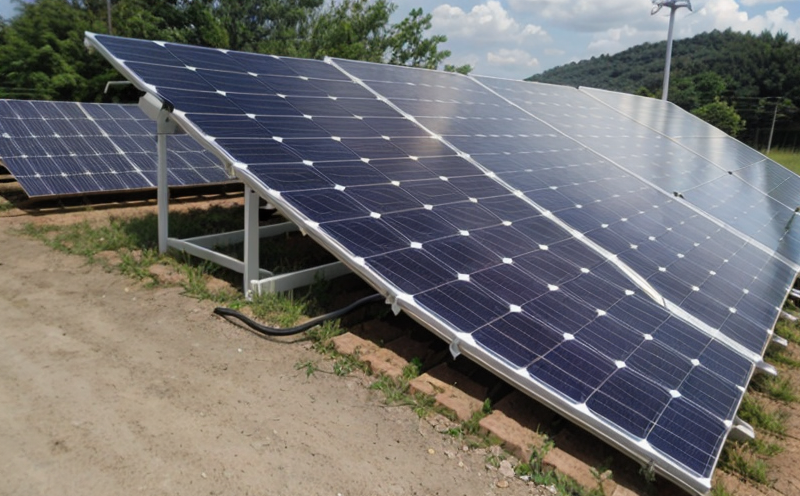IEC 61730-2 Fire Safety Spread Testing
The IEC 61730-2 standard is an internationally recognized guideline for ensuring the fire safety of photovoltaic (PV) modules and solar panels. This stringent testing procedure evaluates a PV module’s ability to contain any arc or flame that may arise during normal operation, thereby preventing potential fires in installations.
The test simulates real-world conditions where a fault occurs within the circuitry of the PV system, such as an open circuit condition between the positive and negative terminals. During these tests, the module is subjected to high temperatures and electrical stresses that mimic the conditions under which arcs or flames could potentially spread.
Understanding this context is crucial for ensuring compliance with safety regulations in various sectors including solar energy, renewable energy systems, and grid integration projects. This service not only aids in meeting regulatory requirements but also enhances product reliability and consumer trust by demonstrating robust fire safety measures.
The process involves precise specimen preparation which includes cleaning the surface of the PV module thoroughly to ensure no foreign materials interfere with the test results. The apparatus used during this testing includes specialized equipment designed to create controlled environments capable of generating arcs or flames within the module. Reporting from these tests provides detailed insights into how effectively each component performs under adverse conditions.
Compliance with IEC 61730-2 is essential for manufacturers, importers, and installers who must demonstrate that their products meet global safety standards before entering markets where this certification is mandatory. By adhering to these guidelines, stakeholders can ensure they are contributing positively towards environmental sustainability goals while maintaining high levels of safety.
Scope and Methodology
| Aspect | Description |
|---|---|
| Test Specimen Preparation | The PV module to be tested must have its surface cleaned meticulously using appropriate solvents and methods. |
| Initial Conditions | Ensure the test environment is controlled with precise temperature and humidity levels as specified by IEC 61730-2. |
| Electrical Stress Application | Apply electrical stress to simulate fault conditions, typically through a short circuit between positive and negative terminals. |
| Flame or Arc Generation | Create controlled arcs or flames within the module using the specified apparatus. |
| Observation Period | Monitor the module for any spread of fire or arc beyond the intended containment area. |
| Data Collection and Analysis | Collect data on the behavior of the module during testing, including temperature rise, smoke emission, and flame propagation. |
Industry Applications
- Renewable Energy Systems Integration
- Solar Power Plant Design and Construction
- Photovoltaic Module Manufacturing
- Grid-Connected Solar Inverters and Converters
- Off-grid PV Systems Installation
Environmental and Sustainability Contributions
The rigorous testing protocols associated with IEC 61730-2 contribute significantly to environmental sustainability by ensuring that solar panels are safe for use in diverse climates. By preventing potential fires, these tests reduce the risk of accidental releases of harmful substances into the environment.
Furthermore, compliance with such standards fosters a culture of innovation and continuous improvement among manufacturers. This encourages them to develop more efficient and safer technologies that contribute positively to global efforts aimed at reducing carbon footprints through increased adoption of renewable energy sources.





